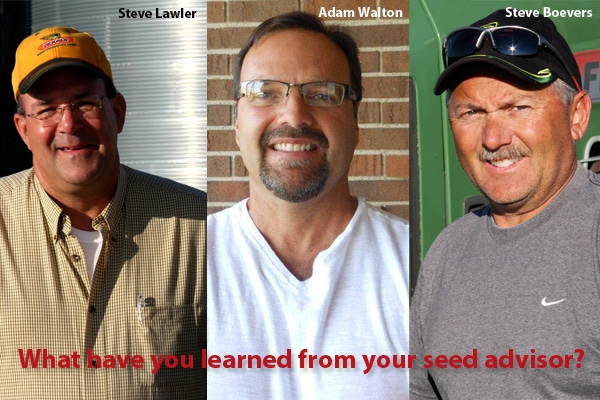August 28, 2013

Steve Lawler, Ogden, Iowa: I’ve learned to trust the people who advise me. The hybrids change so fast I’m not planting anything today that is exactly the same as what we were growing three years ago.
You really have to take a leap of faith that they know what they are talking about. It is hard for a farmer to do all the research himself that the seed rep does, with all of the people he visits with in all types of situations.
I want to plant the latest and greatest. But often the hybrids are similar to what I was planting, just upgraded with traits that are better for this or that. Seed selection has…become a 10-months-a-year job.
It’s all about getting the right hybrid on the right field. This year we probably had 10 different corn hybrids on our farm.
This is in contrast to the drought year of 2012. You can’t really pick hybrids based on disaster scenarios, but this year we did stray away from anything that couldn’t handle dry weather.
Our seed people—all three companies—check our crop and try to add value and be part of this team. These days if a dealer isn’t active with your agronomy, they probably won’t be your seed dealer for the long term.
Adam Walton, Clarion, Iowa
In the past 11 years, we’ve only had two representatives with our major seed supplier. That’s been nice. When you have a long relationship with them, you know they aren’t trying to sell you seed to get rid of a particular hybrid. With today’s precision technology it’s easy to see exactly how particular hybrids or varieties fared so you know exactly what has happened.
I rely on these representatives to let me know what’s available now and what’s coming down the line. We still use a lot of independent data such as F.I.R.S.T. Trials (Farmer’s Independent Research of Seed Technologies) or Integrated Ag Services.
In our area, the hybrids that are Roundup Ready alone are almost doing better without the stacking of additional traits. We haven’t seen the advantage. But it has paid off for my brother in Ohio, using Roundup Ready technology and triple stacks that include rootworm protection.
Now weed resistance issues have us moving back somewhat to multiple herbicide modes of action.
Steve Boevers, Readlyn, Iowa
I value my seed representatives keeping me informed on the latest stuff coming down the pike. Farmers can only do so much research on their own, and we’re probably not privy to some of the information they get.
You have to take what they are telling you seriously. If they tell me that ‘We tested the heck out of this thing and it is definitely something to take a look at,’ then I’ll plant 50 to 100 acres to make sure it works on my farm. I deal with three to four companies a year. I may plant up to 60% of my corn to one company and another 25% to another, but I want to find the hybrid that will make me the most money. I’m not blind to other companies’ products.
I appreciate sitting down in the late fall with the seed reps and discussing what to plant next year. I count on them to let me know if a very good hybrid doesn’t perform well on, say, sandy soil.
This year we planted a fair amount of non-GMO corn where we’d had beans last year. This is the second year where I’ve used our planter set up to deliver insecticide. I’m using some good conventional hybrids, also. We have Roundup-resistant weeds, and I’m going to rotate herbicides.
About the Author(s)
You May Also Like




